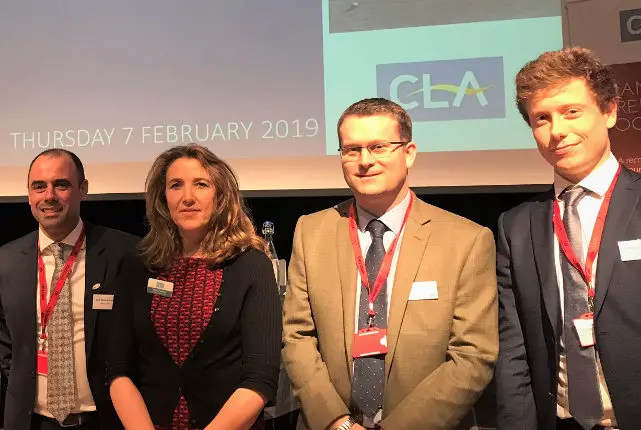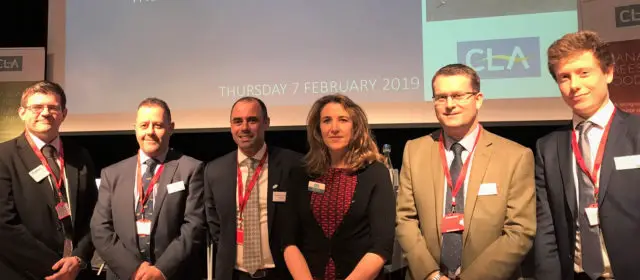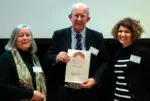Michael shares this latest news on behalf of the Country, Land and Business Association. Ed
Different visions of what the future of farming may look like were set out during the CLA’s latest debate, with speakers and audience members clashing over veganism’s impact on biodiversity.
While there was acknowledgement of – and enthusiasm for – the need for change among many present at the event, ridding land of livestock was widely rejected as impractical and harmful.
Challenges and opportunities
Sponsored by Savills and Brachers, the South East debate looked at the challenges and opportunities the industry is likely to face over the next decade.
Scientific, vegan and land management voices were among those to feature on the panel, who gathered at MidKent College in Gillingham.
Vegan lifestyle a solution to climate change
William Gildea, campaigns and policy officer at The Vegan Society, said the UK’s vegan population had been doubling every two years, from 150,000 in 2014 to 300,000 in 2016 and 600,000 by last year, and offered a solution to climate change and health crises.
Mr Gildea disagreed with fellow speaker Susan Twining, Chief Land Use Policy Adviser at the CLA, on the issue of animal welfare, arguing he did not believe standards were at a high level. He instead promoted a future vision of plant-based farming where rewilding “can play a key part”.
But Mrs Twining said:
“If you want to improve biodiversity, livestock are a management tool to help make that happen. Moving all livestock off land isn’t the answer.”
Removing livestock affects fragile ecosystems
Thomas Brunt, director of rural, energy and projects division at Savills, said:
“During foot-and-mouth in 2001, livestock was removed from land and it affected fragile ecosystems even in a short space of time. I can’t see how suddenly taking out livestock production would work.
“We need to produce red meat more smartly, but we shouldn’t demonise meat production and farmers.”
Apprenticeships and training
Training and apprenticeships were identified as vital to the sector’s prosperity over the next decade.
Antonio Fletcher, employment partner at Brachers, said farming populations were ageing and declining, which could cause issues with continuity and sustaining levels of production.
Can’t rely on migrant labour
Farmers cannot simply rely on migrant labour in the future, so must embrace technology and mechanisation, he said.
Mr Fletcher added:
“It requires investment and skills in the workforce. Apprenticeships where you can earn and learn offer a solution to appeal to the millennial generation.”
Ms Twining agreed, arguing agriculture invests less in training and development than many industries, and needed to catch up.
Positive future for farming
Professor Mario Caccamo, head of crop bioinformatics at NIAB and managing director of NIAB EMR, said farming had a positive future.
He saw the opportunity for “enormous” growth, telling the theatre: “In science we love change. To be successful, innovation is central.”
For many in the audience, a meat-free future was deemed unpalatable, with one member passionately insisting “planes are worse than cows” when it comes to harmful emissions.
“Scary” change on the way
But change is coming. As debate chairman and CLA member Gary Walters concluded in his closing remarks, it could be “scary” as it will affect livelihoods, although great opportunities will also present themselves for those who look forward, embrace science, technology and training, and strike a balance between environmental and financial sustainability.
CLA South East represents thousands of landowners, farmers and rural businesses in Kent, Hampshire, Surrey, Sussex, Berkshire, Buckinghamshire, Oxfordshire and the Isle of Wight.
All eyes on Brexit
Regional Director, Robin Edwards, said:
“All eyes will be on Brexit over the next few months, but as this debate showed there are wider changes facing farming and the rural economy.
“We’d like to thank the sponsors, speakers, chair and the audience for all contributing to a very interesting and thought-provoking evening.”






